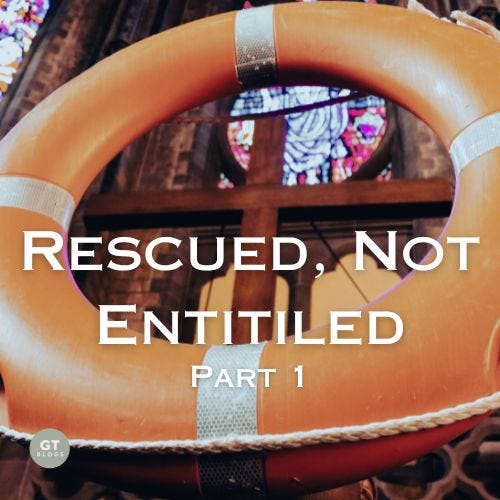“In your distress you called and I rescued you.”
Psalm 81:7
We’re getting very near to the end of my book in progress, “The Art of Unlearning.” I’m still eager to receive any constructive criticism or positive replies. This is the second to the last chapter, and you’ll receive it in two chunks.
This concept—of remembering daily that we are rescued, not entitled, has been life-changing for me. It changes the way I look at every day and the way I contemplate everything I receive and don’t receive. I’m not sure this chapter does it justice, but I’m hoping you, too, will be able to benefit from looking at your life through perhaps a new lens. And I welcome any help in making it clearer and more compelling in the final draft.
When Christians talk about what they “gave up for God” it sounds to me like they’re still missing sin. In truth, sin asks more of us than God does. Jesus brings freedom (Galatians 5:1), while sin enslaves us (John 8:34). Who would ever give a testimony, “I gave up slavery for freedom! That’s how much I love God! I could have stayed a slave, but I loved God so much I chose freedom instead.”
Such testimonies reveal a grotesque sense of entitlement. “Look what I could have had! But I gave it all up for God.”
I didn’t give up anything for God that wasn’t worth less than God or was already destroying me. I’ll never understand who I am and what I have been given until I understand my identity as one who has been rescued. To properly worship God and to properly understand myself, I need to unlearn a sense of entitlement, and learn instead what it means that God has rescued me when I desperately needed rescuing. He is the only one who could and did rescue me. That shapes me and defines every cell of my physical and spiritual being.
In a particularly compelling section of his Institutes, John Calvin explains why we must be so explicit about all that Christ has rescued us from. Calvin’s rumored obsession with God’s wrath is but the threshold to God’s wondrous, virtually incomprehensible mercy. God didn’t just forgive us for jaywalking or driving six miles over the speed limit. He stepped in when we faced the just condemnation of eternal damnation.
Calvin compares one man who is given only a general understanding of God’s displeasure over his sins and the destruction that awaited him and then is told God delivered him from that, with being more explicit about every item of our peril and every aspect of Christ’s rescue, resulting in a much greater and more worshipful appreciation for the benefits we receive in Christ.
“On the other hand, suppose he learns, as Scripture teaches, that he was estranged from God through sin, is an heir of wrath, subject to the cause of eternal death, excluded from all hope of salvation, beyond every blessing of God, the slave of Satan, captive under the yoke of sin, destined finally for a dreadful destruction and already involved in it; and that at this point Christ interceded as his advocate, took upon himself and suffered the punishment that, from God’s righteous judgment, threatened all sinners; that he purged with his blood those evils which had rendered sinners hateful to God; that by this expiation he made satisfaction and sacrifice duly to God the Father; that as intercessor he has appeased God’s wrath; that on this foundation rests the peace of God with men; that by this bond his benevolence is maintained toward them. Will the man not then be even more moved by all these things which so vividly portray the greatness of the calamity from which he has been rescued?”[i]
Downplaying what we’ve been rescued from minimizes the importance of our rescue. It also undermines our worship of such a benevolent, kind, and powerful rescuer.
Let’s now explore the lives of two men: Reuben, whose appalling sense of entitlement ruined him and his reputation, and Dostoevsky, whose sense of being rescued fueled a life of breathtaking, insightful work.
Keep reading with a 7-day free trial
Subscribe to Simply Sacred with Gary Thomas to keep reading this post and get 7 days of free access to the full post archives.





